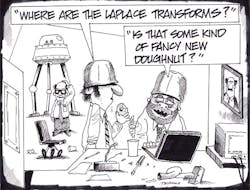By Greg McMillan and Stan Weiner, PE
Heider has more than 30 years experience as a process control engineer with emphasis on the design of advanced process controls and process development. During his career, he designed minicomputer control systems for mammalian cell cultures and agricultural research laboratories, and evaluated and implemented Monsanto’s first distributed control system. He’s now an adjunct professor at Washington University in St. Louis. Recently, he secured a research grant at the National Corn-to-Ethanol Research Center pilot plant at Southern Illinois University in Edwardsville, Ill., to develop inferential control models of the process and demonstrated the successful use of a neural network to predict dryer moisture.
Greg: Bob, what are your thoughts based on your experience teaching in a digital process control lab for four years?
Bob: The students enter my laboratory with very little understanding of process unit operations and equipment. The class consists mostly of control system engineering students and an occasional chemical engineering student or two with an expressed interest in process control. Their mathematics skills are excellent and they’re well-grounded in classical control theory, and yet they have no understanding of very simple real-world examples of process operations. Many aren’t acquainted with fluid- flow or thermodynamic principles that encompass the lab experiments. They also lack the ability to define the very basic control equations relating chemical and allied processing.
Bob Heider, adjunct professor at Washington University in St. Louis, has more than 30 years experience as a process control engineer with emphasis on the design of advanced process controls and process development.
They’re quite adept at solving Laplace transforms, but don’t recognize simple relationships between equipment and process dynamics. For example, when a hot-water heater was installed here, the electricians hadn’t completed the wiring. For a 20-gallon tank with water flowing in and out at 1 gpm, it was apparent that it would take a long time for the hot water to become available.
So I used it as a teaching opportunity. I asked the students to define the equation for the outlet temperature, giving them all the necessary assumptions for a fully mixed tank of water (a simple volume/flow first-order system). They couldn’t solve the problem. Yet they can solve differential equations. A multivariable experiment produced similar results. I lectured them on the Bristol relative gain array, and asked them to define the array using a psychometric chart. They couldn’t do it. Yet they were able to manipulate matrices.
In a student survey, I asked if they were “finding the course beneficial?” I received the following answer from a senior engineering student: “No, I’ll have no use for this. However, it’s interesting learning the material. The lectures assume we’re familiar with the machinery and material, but we are not. It’s all new.”
Students today aren’t as mechanically versed as they were before the personal computer and the Web. They don’t work with objects like radios and cars. How many present-day mechanical engineers first broke down an automobile engine? How many present-day electrical engineers built their own radios? Engineering education used to be about machinery and materials. Now it is about abstract concepts. Real- world applications are sadly lacking.
This situation has its roots deeper than just engineering control education. I read recently that Lego—the maker of plastic building blocks—was closing its U.S. factory because of little demand. They said that children today wanted to do computer games more than create with Legos. This is sad because working with real objects is how all engineering is completed. No matter what innovative process technique is devised, a real plant or operation must be built and operated. We can’t dismiss this as a trivial task. Learning takes place when a student manipulates objects and forms spatial creations. Not all learning can be done on a PC. The tactical feel of organizing real objects adds to the educational experience.
My lab is being asked to teach to both engineering and science students, therefore, it may well be that the emphasis will be either too practical or too theoretical. Since this is a laboratory course, it should be practical.
Many universities have shut down their unit operations labs because of safety hazards. One way a student can learn real equipment is to work as an intern for a company. This is a good experience. However, many companies don’t use these future engineers in a productive way to make the internship a meaningful educational experience.
What’s even more disturbing is that over 75% of my students will enter graduate school immediately after their undergraduate work with no industrial experience. It appears that undergraduate engineering education emphasizes providing a path to advanced degrees over preparing students for the workplace.
Once this unit operations knowledge gap became obvious, I developed two lectures that teach the students enough fluid mechanics and thermodynamics to complete the experiments.
How can a control laboratory function without controlling concrete objects?
Almost all chemical and process control problems are nonlinear. Most students aren’t acquainted with this fact. Several of the experiments demonstrate this behavior, and it’s a major emphasis of the lab.
Students are asked to calculate the process transfer functions, calculate the controller tuning, and obtain stable control. They then run the experiment, and verify the actual behavior against their calculations. This bridges their understanding of control to a practical implementation of the experiments in the laboratory.
Greg: I understand that retirement may be in the cards for more than a few of our readers. So this month, we’re answering the question: “What are the top 10 indications that you should retire?”
Top 10 Indications You Should Retire
10. Your boss assigns you to an instrument upgrade job because “you’re so old you could have installed these instruments.”
9. One of the guys you hosted for an interview trip to your company is now the organizer of the company’s retirement club.
8. Your 401(k) is so out far of date that the investment house has to provide you with a year-end paper copy of your summary without a letterhead.
7. All new engineers are required to meet you as part of their company’s history lesson on ancient fossil formation.
6. You continue to use pocket protectors for your pens and pencils.
5. You can still size a control valve without a PC.
4. You are the only one in the office who wears a tie.
3. Your boss is now the son of one of the engineers you trained.
2. You can remember when the company cafeteria had a hot lunch line.
1. You can remember when your company had a cafeteria.
About the Author
Greg McMillan
Columnist
Greg K. McMillan captures the wisdom of talented leaders in process control and adds his perspective based on more than 50 years of experience, cartoons by Ted Williams and Top 10 lists.
Stan Weiner*
Contributor

Leaders relevant to this article:




